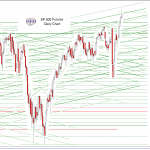The Bank of Japan surprised investors by introducing negative rates last week. Leave aside the fact that the negative rates do not go into effect for more than another week, and even when in effect, will apply to a relatively small amount of deposits at the central bank. The important point is that it is another central bank to introduce negative rates.

Moreover, the yields of Japanese bonds through eight-year maturities have turned negative. In comparison, German yields are negative though seven-year maturities. Swiss government bonds through 15 years have negative yields. Counting sovereign T-bills, something on the magnitude of $7-$8 trillion of government obligations have negative yields.
Japan’s Ministry of Finance sells bonds to institutional investors through the normal channel, but like some other countries, it has a separate distribution channel for retail investors. Government bonds in Japan are sold to retail investors through Japan Post. Previously the government canceled the sales of two- and five-year obligations because the transaction costs would be more than the yield earned. Today they canceled the 10-year sale through Japan Post.
While some expressed consternation over the decision to suspend the sales of such low yielding instrument to households, policymakers are thinking more broadly about the implications of negative interest rates not just on banks but household savers. In a recent speech in Germany, ECB President Draghi pushed back against such argument, pointing to the positive return to German investor, despite the low and negative yields. Capital appreciation (rally in prices) needs to be taken into account.
While Japanese investors may be more accustomed to low interest rates, but a Rubicon has been crossed. Government bonds may not longer be appropriate savings vehicles for retail investors. The bonds sold through Japan Post to retail investors are in small increments (JPY20k or ~$410). It is true that institutional investors may buy a bond with a negative yield if they had a reasonable expectation of selling it at an even more, negative yield. However, retail investors are not typically going to do this.













Leave A Comment